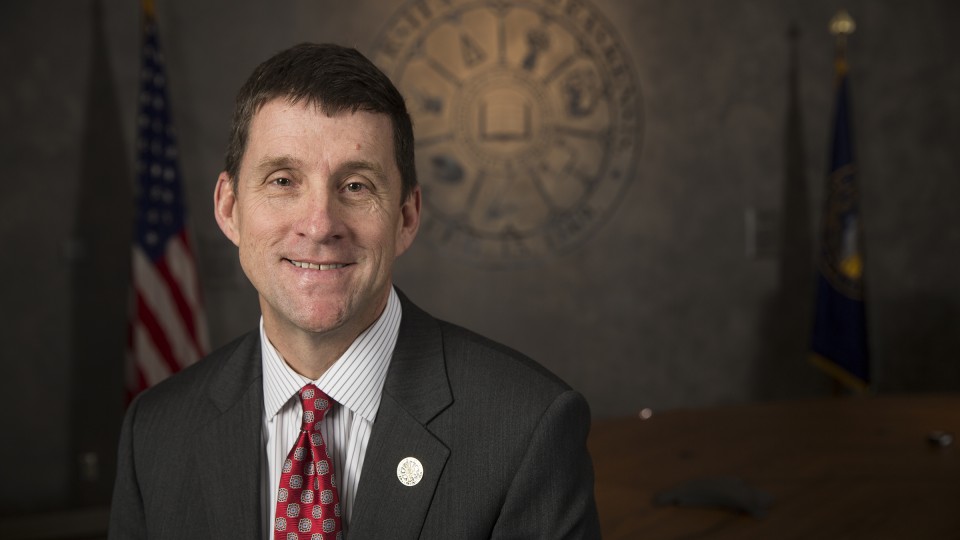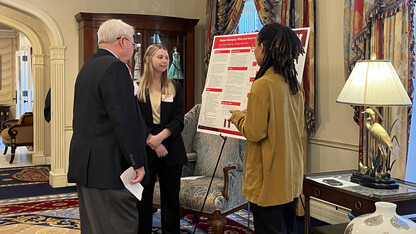· 4 min read
Regents to consider proposed NU budget

University of Nebraska President Hank Bounds has announced a proposed 2016-17 operating budget that makes key investments in the four cornerstones for excellence he outlined during his recent installation address.
The budget proposal, which Bounds shared with the four universities in the NU system on May 18, will be considered by the Board of Regents at its May 25 meeting. It advances each of Bounds’ goals – students, research, partnerships, and people – reflecting the intent to focus on priorities that will allow the university to stand out in an increasingly competitive higher education market.
The proposed budget includes a 2.5 percent tuition increase already approved by the board in 2015. It is one of the smallest increases in 30 years, keeping NU’s costs well below market averages.
In addition, the base of state support in the current biennium will allow for investments in priority research programs and employee salaries. And, state funds designated toward multi-university initiatives will leverage partnerships to grow the economy and meet workforce needs in Nebraska.
“The University of Nebraska can distinguish itself from the rest of the higher education world by focusing on priorities that matter to our stakeholders,” Bounds said. “Continued investments will be necessary to further our goals, but this budget puts us in a strong position. I am grateful to Gov. Ricketts and Nebraska policymakers, particularly Chairman Heath Mello and members of the Appropriations Committee, whose ongoing partnership means a college education and the many benefits it brings will remain within reach for students and families.”
Highlights of the proposed budget:
A 2.5 percent tuition increase approved last June by the board as part of a two-year tuition plan to help students and families plan for the cost of college. The increase means Nebraska undergraduate students will pay about $5 more per credit hour. NU’s costs remain well below peer averages; for example, UNL’s tuition and fees are 50 percent below the average of Big Ten public institutions.
A corresponding 2.5 percent increase in need-based financial aid, including Collegebound Nebraska, which promises full tuition coverage for Pell-eligible Nebraska undergraduates. The increase, which brings the university’s annual state-aided investment in financial aid to more than $11 million, ensures that Nebraska students with the greatest financial need will continue to pay zero in tuition.
A $2.5 million increase in NU’s Programs of Excellence initiative, which provides strategic investments in priority academic areas where the university has opportunities for national or global leadership. Past Programs of Excellence investments have advanced the university’s work in engineering, information technology, medical research, agriculture, early childhood education and other areas important to people in the state and beyond. The increase brings NU’s total investment in the 16-year initiative to $30 million annually.
A 2.5 percent increase in the salary pool for non-unionized employees that will be distributed on the basis of merit, plus a $3 million pool that will address targeted salary competitiveness issues. While it has made progress in recent years, the university continues to fall short of the board’s goal to meet or exceed the average salaries of its peers. University of Nebraska-Lincoln faculty salaries are 4 percent behind their peers and Univeristy of Nebraska Medical Center salaries lag 6 percent. Taken together, the investments in compensation will reward employees who have demonstrated exceptional merit while also allowing NU to keep up with market increases so it can continue to recruit and retain top talent.
As part of the university’s 2015-17 budget request, the governor and legislature provided designated support for several economic development initiatives. The state is providing increased funding this year for the Health Science Education Complex on the University of Nebraska at Kearney campus, which houses expanded UNMC nursing and allied health programs; a UNMC-University of Nebraska at Omaha biomedical institute; and a virtual training center at UNMC called the Center for Advanced Interprofessional Learning. The state also will continue its investment in the UNO-based Nebraska Business Development Center and an international trade and finance institute at UNL named for former U.S. Secretary of Agriculture Clayton Yeutter.







